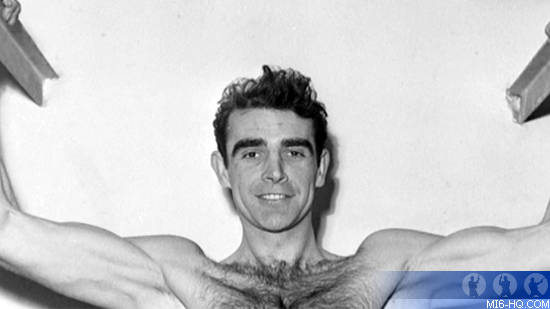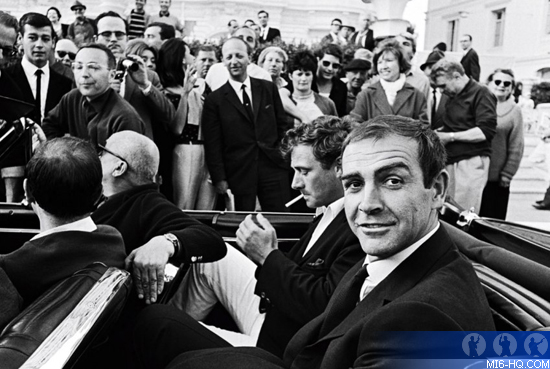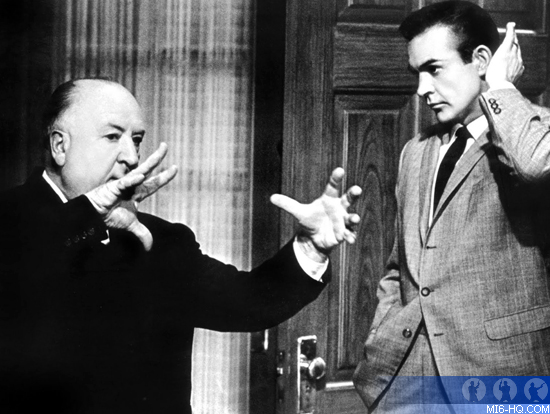Talking Pictures Interview
16th January 2015
MI6 caught up with series producer Simon Goretzki to find out what is in store for Bond fans in this weekend's Sean Connery episode of 'Talking Pictures'
 By MI6 Staff
By MI6 Staff
Can you tell us how you got started in the industry and you role in the production of Talking Pictures?
My role is Series Producer, which in this case means that I help choose which actors we make episodes about; make sure that the BBC actually has enough archive of the subject to make a 30-45 minute programme; go through the archive and pick out the best bits; think about how those best bits will all fit together; write a script; work with an editor and/or producer who will actually edit it all together; make sure the recording of the script - in Talking Pictures the narrator is the actress Sylvia Syms - goes well, and then finally double-check that the final programme is suitable for the time-slot it is given and that we haven't accidentally left in any inappropriate language or anything unsuitable. So it's basically taking the programme from idea stage to completion.
My particular route meant a degree in journalism leading to working for years in television news, at first ITN and then at the BBC and particularly children's news on the programme "Newsround" for several years. Then took a role in a bit of the BBC that deals with archive, old programmes and repeats - which is how come I get to trawl through the BBC archives looking for hidden gems that can be polished up and shown again. That can mean just repeating an old programme or, as in this case, digging up lots of magic moments that we then repackage into a brand new show.
How do you select fit subjects for the episodes, what factors are considered?
This series (currently) goes out on weekends on BBC2, around midday - and the idea has always been that an episode on a particular actor goes out alongside a classic movie that they have starred in. So one of the first questions we have to ask is - which films do the BBC currently have the rights to show? Once we've established that we have a film, we then, obviously, need to know that there is actually enough content in the archive to make a programme on our subject. Sometimes there just isn't - I would love to make an episode on Cary Grant for example, but for whatever reason he only ever was interviewed by the BBC about twice, and the total duration of those interviews is about 4 minutes long. Luckily for me, loads of other big names were on quite a lot, so we're going to end up with around 35 episodes in all.

How much time and energy goes into the production of a project, for instance, the forthcoming Sean Connery episode?
Typically, once a subject has been selected it takes a day or two to trawl through the archive material and maybe another day to pick out the best bits, come up with the order and write a script. Then approximately 4 to 5 days to edit it all together and get it looking and sounding as nice as possible. So very roughly it's about 8 days per episode in all. As for energy - it's pretty full on and budgets are tight these days, so we have to squeeze as much effort into those days as we can!
Did you have any expectations about the original Bond star that were shaken or altered by the compilation of this documentary?
I'm something of a James Bond nerd and have been a massive Connery fan for ages - seen all the films, read a biography or two. Despite that, for some reason it didn't occur to me that we might be able to make an episode on him because as he is famously resistant to the charms of the media, I had automatically assumed that he would, like Cary Grant, be one of those people who just didn't do many interviews with the BBC. I think also the fact that the Bond films have always been on ITV and never on the Beeb just added to my sense that there wouldn't be much for me to find in the vaults. So that was one expectation altered - and I was thrilled to find as much good stuff as I believe we have done.
Other than that, I was struck mainly by how the interviews we've got reveal how difficult his relationship with the Bond films was. Connery comes across as looking trapped by the franchise, doesn't want to be there, is bored by the whole circus and yet the time between the then earth-shattering announcement of his retirement after "You Only Live Twice" and his comeback with "Diamonds" is only 4 years. Which is no time at all, and certainly nothing in terms of film production. And then after saying he would never go back - and its clear he hated it by then - it was only 12 years later that he returned with "Never Say Never Again". For some reason, looking back through the archive highlights how relatively short his time away from being Bond actually was at the time. And seeing this man who we know as being famously strong in his convictions, and even reputedly intolerant of weakness and dithering in others, clearly going back on his own word with regards to playing Bond, not once but twice, is quite fascinating. Something forced him back each time. Was it just the money? Maybe it was - but there are moments in the programme where you get a sense that he both enjoyed and hated being Bond, and that struggle was more complicated than being simply a matter of finances.

What are some of the highlights, for you, of the Sean Connery episode?
There are quite a few - I love the fact that one interview takes place on the edge of a set during a break in filming on "Goldfinger". There's a female reporter chatting to Connery whilst all sorts of noise and banging is going on in the background, and then Connery gets called back onto set and he has to leave. It's the sort of interview that sadly you just wouldn't get these days - no publicity people agreeing questions in advance... it looks like they just turned up, walked in and happened to get an interview with one of the biggest stars in the world.
There's an interesting bit shot at the time of "You Only Live Twice" where Cubby Broccoli is talking to Alan Whicker about how the series could possibly continue even if Connery left. You get a sense that despite the massive success of all the previous films, Cubby is only really now having to confront the fact that his leading man might be off. But you also see the mogul in him: straight away saying that he wants Bond to be as long-lasting as Sherlock Holmes, and having that vision of longevity, even though most people were thinking no Connery equals no 007. There's a great little sequence showing Connery being repeatedly asked questions about Bond at a press conference for something completely different, and if its possible to feel a moment's pity for a multi-millionaire movie star, that might be one of those moments. And finally, we've got some lovely moments from a programme Connery took part in called "Scene by Scene", where he's in his late 60s, looking back on his career and talking about films like "Darby o' Gill" and "Marnie" with, in some cases, real warmth and affection.

Do you have plans to feature any other Bond alumni?
Personally I would love to - I'd love to do one on Roger Moore, but I don't think the Beeb has any of his films up their sleeves, and without them we currently wouldn't go ahead. Saying that, I might mention it and see if we can squeeze him through one day.
Many thanks to Simon Goretzki. Sean Connery will appear on tomorrow's episode of "Talking Pictures", BBC2, Saturday 17th January at 12:45pm. For more information and to watch past episodes on iPlayer visit BBC.co.uk.







